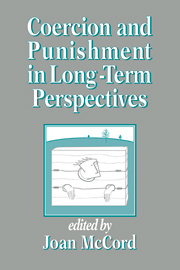Book contents
- Frontmatter
- Contents
- List of contributors
- Acknowledgments
- 1 Introduction: coercion and punishment in the fabric of social relations
- I Mental health, coercion, and punishment
- II Family socialization practices and antisocial behavior
- 5 Coercion as a basis for early age of onset for arrest
- 6 Disentangling mother–child effects in the development of antisocial behavior
- 7 Family and child factors in stability and change in children's aggressiveness in elementary school
- 8 Kindergarten behavioral patterns, parental practices, and early adolescent antisocial behavior
- 9 The reciprocal influence of punishment and child behavior disorder
- 10 The development of coercive family processes: the interaction between aversive toddler behavior and parenting factors
- III Aggression and coercion in the schools
- IV Deviance, crime, and discipline
- V Measuring and predicting in studies of coercion and punishment
- Name index
- Subject index
8 - Kindergarten behavioral patterns, parental practices, and early adolescent antisocial behavior
Published online by Cambridge University Press: 29 September 2009
- Frontmatter
- Contents
- List of contributors
- Acknowledgments
- 1 Introduction: coercion and punishment in the fabric of social relations
- I Mental health, coercion, and punishment
- II Family socialization practices and antisocial behavior
- 5 Coercion as a basis for early age of onset for arrest
- 6 Disentangling mother–child effects in the development of antisocial behavior
- 7 Family and child factors in stability and change in children's aggressiveness in elementary school
- 8 Kindergarten behavioral patterns, parental practices, and early adolescent antisocial behavior
- 9 The reciprocal influence of punishment and child behavior disorder
- 10 The development of coercive family processes: the interaction between aversive toddler behavior and parenting factors
- III Aggression and coercion in the schools
- IV Deviance, crime, and discipline
- V Measuring and predicting in studies of coercion and punishment
- Name index
- Subject index
Summary
I will readily concede that the difficulty of inculcating in children a sweet and cheerful obedience arises partly from their nature. There are trying children, just as there are trying dogs that howl and make themselves disagreeable for no discoverable reason but their inherent “cussedness.” There are, I doubt not, conscientious painstaking mothers who have been baffled by having to manage what appears to be the utterly unmanageable. Yet I think that we ought to be very slow to pronounce any child unmanageable.
J. Sully (1895, p. 290)Harsh, inconsistent, and erratic discipline, lack of supervision, parental rejection, disharmony, separations, or absence, parental modeling, family history of antisocial behavior, and disturbances of parent–child attachment have repeatedly arisen in the literature as important predictors of aggressive and antisocial behavior (e.g., Eron, Huesmann, & Zelli, 1991; Farrington & Hawkins, 1991; Loeber & Dishion, 1983; McCord, 1979; Widom, 1989). In their review of this literature, Loeber and Stouthamer-Loeber (1986) proposed four paradigms of family processes and antisocial or criminal behaviors: (1) the neglect paradigm, examining parental involvement with their children and parental supervision; (2) the conflict paradigm, stressing parental disciplinary practices and rejection of children; (3) the deviant behaviors and attitudes paradigm, focusing on parental criminality and deviant attitudes; and (4) the disruption paradigm, refering to marital conflict and parental absence.
Information
- Type
- Chapter
- Information
- Coercion and Punishment in Long-Term Perspectives , pp. 139 - 153Publisher: Cambridge University PressPrint publication year: 1995
Accessibility standard: Unknown
Why this information is here
This section outlines the accessibility features of this content - including support for screen readers, full keyboard navigation and high-contrast display options. This may not be relevant for you.Accessibility Information
- 4
- Cited by
